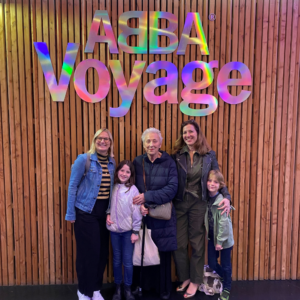Transport Focus is acutely aware that passenger assistance across the rail network can be hit and miss. There are many accounts from disabled passengers of staff not providing the assistance as it was booked, or from those seeking to travel with more spontaneity, as ‘turn up and go’ passengers. This makes it difficult for disabled passengers to have the confidence to travel without fear of incident.
That lack of consistency is perhaps best demonstrated by my recent experience of travelling with my elderly mother, the words of one passenger who responded to our Rail User Survey, and the account of a recent journey we received from an accessibility expert working within the transport industry.
For my 85-year-old mother, who has mobility issues, the prospect of travel had lately become quite daunting – so when I first suggested going to see ABBA Voyage at the purpose-built arena by Queen Elizabeth Olympic Park, it seemed out of the question. However, our experiences on the Elizabeth line and the DLR were a pleasant affirmation that sometimes – travel does work.
As one of the UK’s one in five with a long-term illness, impairment or disability, my mum was understandably cautious about the excursion, having not used public transport in over a year. We know from our research asking rail passengers to tell us what is important to them, that the accessibility of trains and stations are of the utmost importance to disabled and older passengers. My mum finds steps difficult, being on her feet tiring and crowds overwhelming. With my two kids in tow, we slowly set out one Saturday afternoon to one of her nearest tube stations, Bond St, which thankfully is home to the sleek and step-free Elizabeth line.
Stage one – getting to the platform, onto the train and finding a seat. This went remarkably smoothly, despite the large and vocal group of young football fans who jostled on with us (delighting my seven-year-old son with their – shall we say – ‘colourful’ language). As crowded as it was, the carriage was clean, comfortable and air-conditioned.
After travelling the five stops to Canary Wharf, it was time to get off and catch the Docklands Light Railway (DLR). This was where we encountered our first and only hitch. We needed to walk a few minutes to West India Quay, and not being blessed with the world’s best sense of direction, I took us the wrong way. However, station staff were soon on hand to put us straight. In fact, the DLR staff were a joy to deal with, the lady checking our tickets happily answering my daughter’s questions about the interestingly named Pudding Mill Lane.
Six stops and 10 minutes later, we arrived at said station, helpfully just over the road from the ABBA Arena. Opened in 2014 and home to an ABBA merchandise shop, it was spacious and full of smiling staff who seemed to have caught a bit of the prevailing disco fever. The entire journey had been step-free and my mum – having sworn she could only do it by taxi – was pleasantly surprised and able to relax and enjoy the concert.
Reading some of the feedback from disabled passengers who responded to our Rail User Survey, happily, it seems my mum’s experience wasn’t unique:
“My journey to Oxford was very good. The passenger assistance was excellent, and they brought me to my reserved standard class seat before general boarding. My original train with a reserved seat back from Oxford was cancelled. Fortunately, I had arrived at the station in plenty of time and the excellent passenger assistance put me on the earlier delayed train to Paddington. The standard class coaches were crowded, and passenger assistance put me in an available seat in 1st class I couldn’t have had better service.”
On the flip side however, we’ve recently heard from an accessibility expert with lived experience, who recalled an incident involving disruption that gave them cause to complain to the rail operator.
They were travelling to Birmingham to attend a sight loss conference; the organisers of which had contacted the operator to warn that there may be a higher than usual number of passengers travelling to the city that day. Unfortunately, the train before the passenger’s one had been cancelled. Despite having made a reservation, and needing a seat because of multiple impairments, the passenger was faced with an overcrowded carriage and forced to stand. Among others standing were several guide dog users (there were five plus in the carriage) and people with canes. At no point during the journey did a member of staff from the train operator try to relocate any of the passengers or ensure that those who needed a seat were offered one.
So, whilst there are positive stories to be told, the industry must get better at providing a more consistent level of service, so that all disabled passengers can travel with confidence, and have the same opportunities as everyone else.
Miranda
Transport Focus
The post Access all areas? appeared first on Transport Focus.

